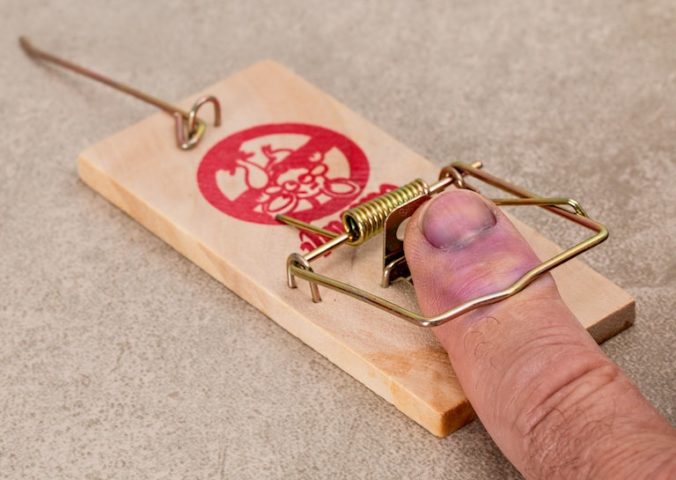What causes self-sabotaging behavior? At times, people see a pattern with themselves that whenever they are about to make a big change in life, they start procrastinating and find a reason to not go through with it. The inability to take action annoys the living heck out of them, yet they cannot do anything about it. As a result, they also cannot create the life they truly dream of. That is when the question is asked – “what causes self-sabotaging behavior and how do I get rid of it?”
What causes self-sabotaging behavior
Negative past experiences
One of the core causes of self-sabotaging behavior lies in our life’s past experiences.
As we grow, we gain wisdom simply by experimenting and experiencing life. And as we experiment, we inevitably make mistakes, which is a natural part of the process. As a matter of fact, making mistakes and learning from them is probably the quickest and most effective way to gain that wisdom.
Unfortunately, though, some of those mistakes become a bit more dramatic than we would like them to be, making us feel miserable for long periods of time.
In addition, they can negatively affect how we live our lives in the present moment and in the future. These mistakes scar us and eventually become a part of who we are and how we experience the world around us.

Probably, the most common example of this is a teen falling in love for the first time and then having their heart broken by another person. As a result of this emotionally difficult experience, that teen may form an opinion that “all boys/girls cannot be trusted”. And although that belief is totally false and is based on one specific negative experience, it nevertheless can cause a person to close up, become skeptical and even paranoid towards every new partner.
Formed habits at childhood
Another common cause of self-sabotaging behavior lies in the people that surround us during childhood.
Most of the self-sabotaging behavior does not come from a conscious decision to act that way. Instead, it comes from the subconscious, making it sometimes very hard to understand why we behave in the ways we do.
As children, our brains are like sponges, sucking in everything that happens around us. Our surroundings, experiences and also the people whom we grow up next to are the ones that take part in forming our personality. This is what psychologists refer to as the nature vs nurture debate, nature referring to our genes and nurture to the surroundings that we are brought up in.
Therefore, the cause of your self-sabotaging behavior can often be traced to your parents, siblings and other people that you grew up with. It can even be one of your teachers in school.
Let’s pretend your father was a role model for you. He was a hard-working, honest man, and you absolutely admired that. In addition, he may have often said that all rich people are greedy. You didn’t think of this idea much then, but now you realize that for some odd reason you are having a hard time making good money with your business and that you don’t really trust wealthy people.
After a careful self-analysis, you come to the conclusion that this strange attitude towards money and rich people is coming deep down from your subconscious mind, causing it to self-sabotage you whenever you have the opportunity to make a lot of money with your business.
Despite the behavior doing you a lot of harm in the present moment, the good news is that by becoming aware of it, you can easily change it towards something more positive. It doesn’t need to affect you if you don’t want it to.
How to overcome the self-sabotaging behavior
1. Look inwards
As mentioned previously, self-sabotaging behavior comes not from the conscious mind, but from the subconscious, which is why it is very important that you begin to look inside of yourself for signs of it.

You may have had those negative experiences in the past, been influenced in your childhood by something or someone else, or you simply may be afraid of making changes in life. All of these things may result in you sabotaging your future success.
For example, you know that you must change your job in order to grow as a professional, but you are too afraid to do it. As a result, you comfort yourself by saying that the current job pays you well enough (although that may not be really true), you feel stability there and that if you do leave, you may not find a better job.
All of the mentioned above are things we often say to ourselves when we fear change. We use them as arguments and we believe them. However, if only we were to search inside, we would realize that they are nothing more than subconscious fear of change manifesting itself as those statements.
In addition, it’s also good to know that even though self-sabotage may seem like something negative and unwanted, this behavior could have emerged as a result of something else. Maybe to protect yourself from a certain risky behavior as a child, you created a defense mechanism which did its job then, but is holding you back today. Again, look inside, find the root cause of it and change it.
2. Challenge yourself
Once you have an idea of what causes your self-sabotaging behavior and what it affects, it’s time to challenge yourself.
Let’s imagine that you are a perfectionist, and it’s affecting your personal life. You cannot stay in a relationship for long because as soon as you see that the other person has interests different from yours, you run away from the relationship. But at the same time, you also understand that there is nothing wrong with being very different. As a matter of fact, you know that it can make the relationship exciting. In other words, you know that the desire to have everything perfected is sabotaging your relationships.

Because you want to fix your problem, you will no longer do on a Friday evening only what you want and expect the other person to enjoy 100% of it. Instead, you will challenge yourself by asking your partner to choose what he/she wants to do instead, and you will appreciate them even more for being different from you.
And to add an example from my life, I used to fear public speaking more than anything else in the world. As a result, despite knowing that it will help me grow, I used to avoid every single speaking opportunity. I knew that it would benefit me, but I ran from it anyway.
To tackle it, I challenged myself. I signed up for Toastmasters, which is an organization that helps with public speaking and leadership skills. That was the end of self-sabotage in that area of life.
3. Acknowledge your achievements
You’ve probably heard of the term “Imposter Syndrome“. Well, that’s when you take everything you know and have achieved, and make it insignificant. You doubt your accomplishments, and that holds you back from making any new success that you may be after. You are afraid to make the next step because you think that you don’t deserve it. This problem is actually quite common.
To beat this problem, stop focusing on your flaws and the negatives. We all have them, and that’s ok. You are doing yourself a disservice and sabotaging your future success with these thoughts. Instead, focus on what you have so far achieved. Acknowledge it all and use it to propel yourself forward.
Click To TweetWhere focus goes, energy flows!
– Tony Robbins
4. Set goals
If you ask me what is the best and most straight-forward way of handing self-sabotage, then I will tell you to start settings goals.
Settings daily, weekly and monthly goals is an amazing way to move forward and get things done. But also, if you see that you are constantly self-sabotaging your ability to be happy, by having instead your focus set on the accomplishment of goals, you will remove all of that unnecessary tension from your life. I say this from experience.
You can make baby steps, but be sure that you are constantly moving forward. By having that continuous movement in life, you will have no time to spend on self-sabotaging behavior!
P.S. This was it for now. If you enjoyed the post “What Causes Self-Sabotaging Behavior – 4 Ways to Get Rid of It”, but feel like you need more accountability, then I suggest you check out the 100-Day Challenge program. It’s a program meant to help you reach your goals faster. Learning to control self-sabotaging behavior could be one of those goals to accomplish.
Thank you for stopping by and good luck!
Please click below to subscribe and to follow us on social media:
Click here to follow us via E-mail!
Click here to follow us on Facebook!
Click here to follow us on YouTube!
Click here to follow us on Instagram!
Click here to follow us on Twitter!


 15 Best Inspirational Movies That Teach to Never Give Up
15 Best Inspirational Movies That Teach to Never Give Up
 50+ Best Self-Help Books That Will Change Your Life Forever
50+ Best Self-Help Books That Will Change Your Life Forever
 Short Motivational Stories of Failure and Success That You Must Know
Short Motivational Stories of Failure and Success That You Must Know
 10 Examples Where the Power of Positive Thinking Kicks Ass!
10 Examples Where the Power of Positive Thinking Kicks Ass!
 What to Do When Someone Is Better Than You? – Dealing with Jealousy
What to Do When Someone Is Better Than You? – Dealing with Jealousy

Leave a Reply